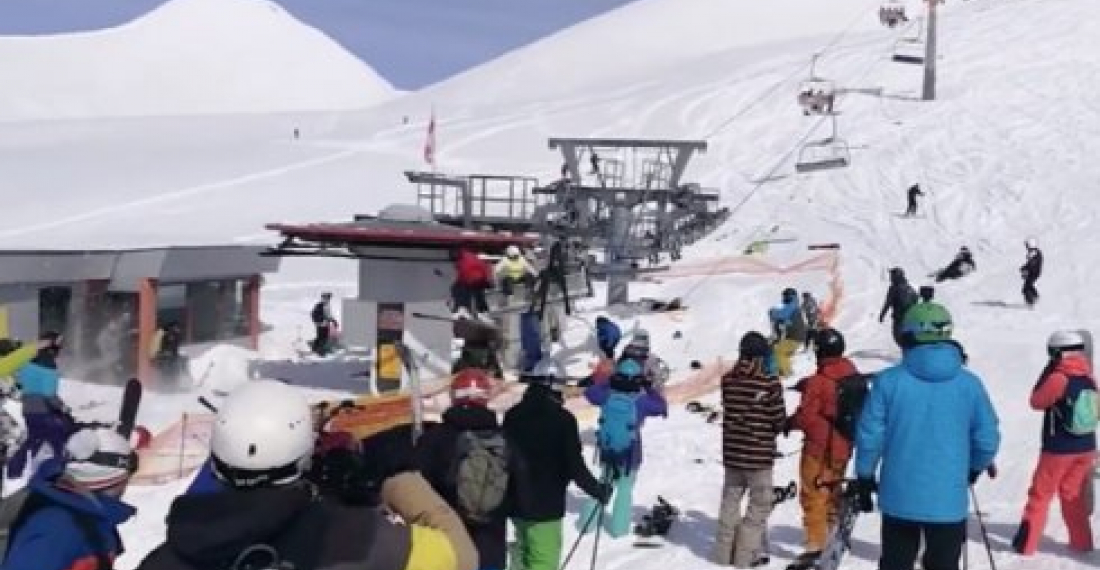An incident in Georgia's Gudauri resort is the latest in a number of serious accidents throughout the region that many feel were avoidable writes Dennis Sammut in this week's Monday Commentary. It is time for the region to put safety first!
Pictures coming out from Georgia's alpine resort of Gudauri last week were not of the sort the Georgian government would have liked to see it. Graphic images showing an incident in which several people were injured when a ski lift went out of control and started going backwards fast were flashed all over the world. Some skiers jumped and others were flung from the chairs, and many were injured. The incident is being investigated, and the Georgian government has promised to punish anyone found responsible. But the incident has once more brought to the fore issues of health and safety throughout the South Caucasus region.
Problems with health and safety in Armenia, Azerbaijan and Georgia take many forms, ranging from problems with faulty appliances, to fires engulfing whole buildings. The three countries have seen rapid economic development over the last decade, and this brought with it a building boom. Very often corners have been cut for the sake of speed, and profit.
Health and safety issues are often dismissed as another quirk concept coming in from Europe. This is partly the result of the macho approach of many men in the region. Western companies - used to working in a tough legislative framework that imposes heavy penalties for lack of health and safety procedures - often have problems getting local staff to follow procedures on health and safety issues simply because they think they are tougher.
But very often the problem in the region is greed. Some business people simply do not want to spend the money to ensure proper health and safety measures. It is also likely that some of the major incidents that have happened in recent years were also the result of corruption - with municipal officials closing their eyes to infringements. Investigations into a number of incidents seem to have led nowehere..
Armenia, Azerbaijan and Georgia are now well integrated in global processes. All three seek to establish themselves as popular destinations for tourists from Europe and elsewhere. All three have, or are in the process of negotiating, close economic and trade deals with the European Union. If ever health and safety issues were a "luxury", this is now definitely no longer the case.
In all three countries four things need to happen. First the regulatory framework needs to be strengthened. The argument for reducing procedures in order to help business is a strong one, and is often heard in EU countries too. But regulations on health and safety should not be weakened.
The second measure requires adequate training for people whose work involves the health and safety of others. The need for this hits visitors to the region in the face very quickly. Every where you turn you see incidents that are ready to happen, and wonder why the lack of action.
Thirdly whilst all three countries have, at least on paper, institutions that are responsible for health and safety issues, very often responsibilities are spread between many institutions, making it difficult to point the finger at who is responsible when procedures are not followed, or worse when incidents happen. Some European countries have "Health and safety authorities" whose remit cuts across government offices, and who are well empowered and resourced. Best practice in this regard needs to be introduced.
Last but not least, there needs to be nation wide campaigns to make people more aware of health and safety risks and measures. Part of the problem is in the mind-set, part in lack of awareness. Governments need to take the lead, and if they don't civil society needs to step in. This is an area where, with one or two exceptions, NGOs have failed too.
Governments in Armenia, Azerbaijan and Georgia have embraced the modernisation of their societies. They are making huge efforts to develop their infrastructure and their economy. Health and safety measures need to accompany these processes, not as an irritating add-on, but as an integral part of the process. And when it comes to a choice, the answer needs to be unambiguous: "Safety First".
Source: Dennis Sammut is the Director of LIKS (Dialogue, Analysis and research) His Monday Commentary appears weekly on commonspace.eu
Photo: Images from an incident in the Georgian alpine resort of Gudauri on 16 March 2018 (Picture courtesy of Irish Sun)







